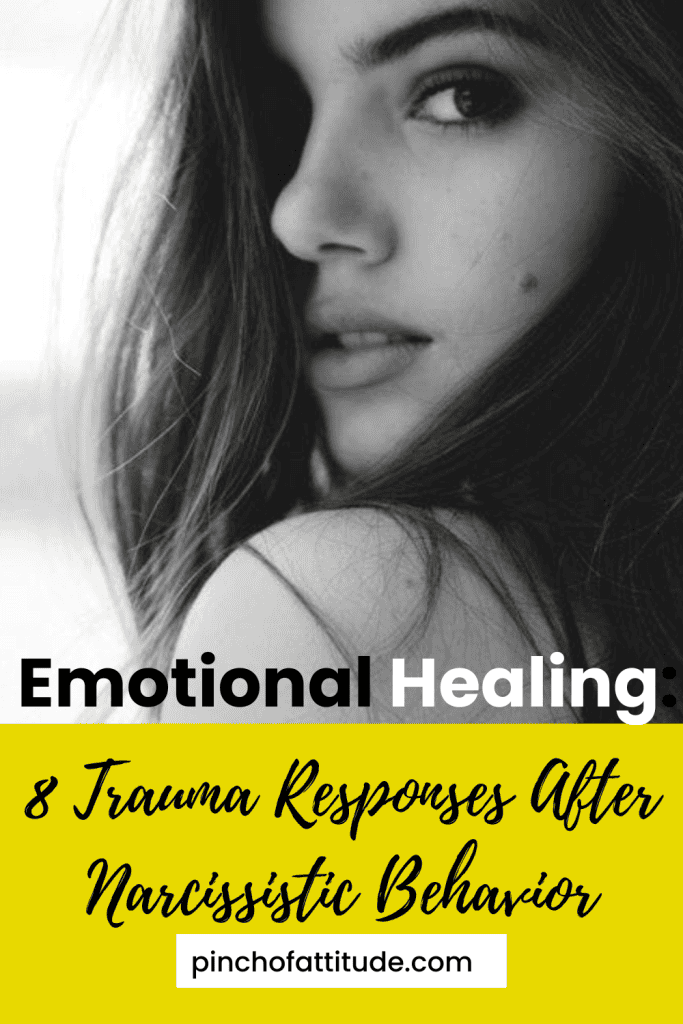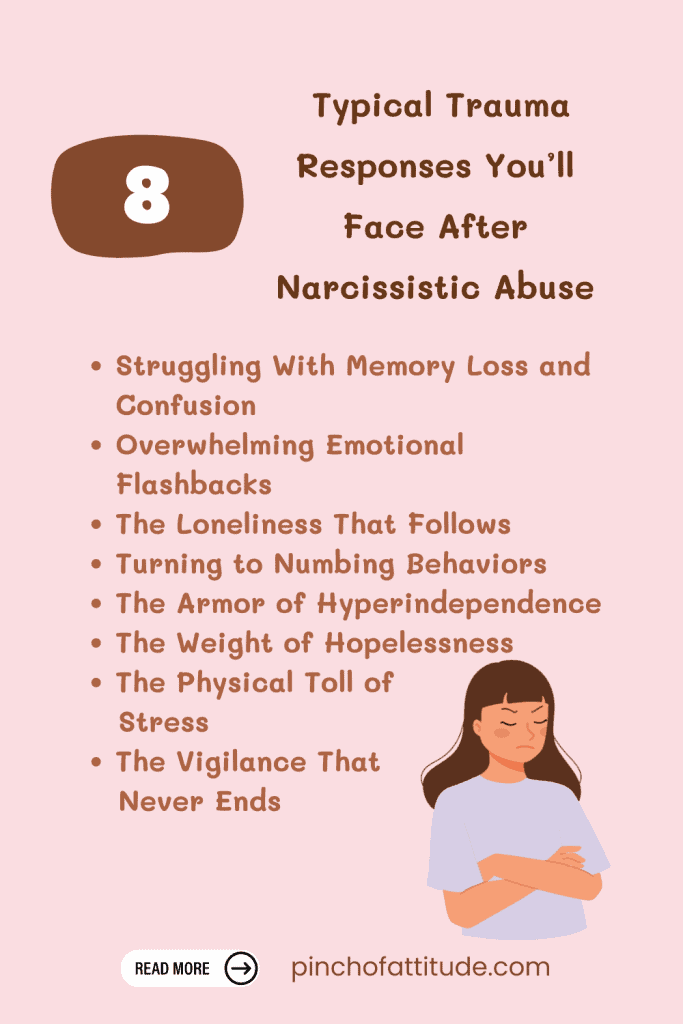Narcissistic abuse is no walk in the park, it’s more like a marathon through a minefield.
I can say that because I’ve been there years ago.
If you’ve been there, you know that the aftermath isn’t just something you can just “shake off.”
The effects run deep, and they stick around like that annoying pop song you can’t get out of your head.
Growing up in a toxic environment where my narcissistic mother’s affection was reserved for my siblings while I was left to fend for myself.
I quickly learned that surviving meant enduring a lot more than just physical distance.
The crazy, confusing, and downright exhausting symptoms you’re experiencing are not only normal, but they’re also part of the package deal that comes with surviving this kind of abuse.
So, don’t be too hard on yourself, it’s okay.
The good news? You’re not alone and you should never ever carry shame about it.
Instead, let’s break it down and talk about the 8 typical and totally normal trauma responses after enduring narcissistic abuse.
Table of Contents
1. Struggling With Memory Loss and Confusion

Ever find yourself forgetting things that used to be second nature?
Or do you feel like your brain has turned into a foggy mess?
That’s your mind’s way of trying to protect you from the unbearable reality you have to face.
Why Your Mind Clouds Over?
When you dissociate during traumatic events, your brain effectively goes on autopilot, creating gaps in your memory.
It’s like your mind is saying, “Nope, we’re not dealing with this right now,” and tucks those painful memories into a dark corner.
I remember growing up in Cambodia, feeling like I was invisible in my own family.
My mother’s words stung, she made me feel like I wasn’t good enough, smart enough, or even worthy of love.
Those memories are hazy now, like looking through a fogged-up window.
It’s not that I’ve forgotten; it’s that my mind has done its best to protect me.
The Purpose of Forgetting?
It’s not that you’re losing your mind; it’s that your mind is doing its best to keep you safe, even if that means things get a little fuzzy.
These lapses in memory or confusion are normal responses to abnormal situations.
Your brain is wired to survive, and sometimes survival means not remembering every painful detail.
2. Overwhelming Emotional Flashbacks

Ever get hit out of nowhere with a wave of emotion so intense it feels like you’re drowning?
That’s an emotional flashback.
Reliving the Past
It’s like your body suddenly remembers that one awful thing you’ve been trying so hard to forget.
And it’s not just a memory, it’s a full-blown reliving of the fear, pain, or anger.
Your heart races, your hands shake, and you feel like you’re right back in that nightmare, even if you’re just sitting on your couch.
I still get those flashbacks, especially when I hear about someone going through something similar.
Suddenly, I’m that 13-year-old kid again, just trying to survive the emotional landmines my mother and siblings set for me.
Healing Through Flashbacks
These flashbacks are your body’s way of processing trauma.
And while they’re terrifying, they’re also a sign that your mind and body are trying to heal.
It’s your body’s way of saying, “Hey, we need to deal with this,” even if it feels overwhelming.
Understanding that these flashbacks are a part of the healing process can help you navigate through them with a little more compassion for yourself.
3. The Loneliness That Follows

You’ve probably heard the phrase “alone in a crowd.” That’s what chronic loneliness feels like.
Feeling Disconnected
It’s not just that you’re physically alone; it’s that you feel fundamentally disconnected from the world around you.
This usually happens because, during the abuse, you had to abandon parts of yourself to survive.
For me, that meant pretending I didn’t care when my narcissistic mother showered my siblings with praise while I was ignored.
It meant putting my own dreams and desires on hold because I was too busy just trying to keep the peace.
Reconnecting with Yourself
So now, when you try to reconnect with yourself, it feels like there’s no one there. But trust me, you’re still in there, and you can find your way back.
It takes time, and it takes patience, but that connection to yourself is worth fighting for.
Gradually, as you begin to nurture your true self, that deep loneliness starts to fade.
4. Turning to Numbing Behaviors

Sometimes the pain is just too much to bear, and that’s when you might find yourself reaching for something anything to take the edge off.
Temporary Escapes
Whether it’s binge eating, drinking, or any other self-destructive behavior, these are just your body’s way of trying to avoid feeling the deeper pain.
It’s like trying to put a Band-Aid on a bullet wound temporary relief that doesn’t address the real issue.
When I first moved to Canada, I turned to food for comfort.
It was something I could control in a world that felt completely out of control.
But of course, that didn’t solve anything; it just numbed the pain temporarily.
Moving Beyond Numbing
The thing is, these behaviors might numb you out for a while, but they can’t erase the pain.
They just keep you stuck in a cycle that’s hard to break free from.
Recognizing these behaviors for what they area survival mechanism is the first step toward finding healthier ways to cope.
Once you start addressing the pain beneath, the need for these numbing behaviors will begin to diminish.
5. The Armor of Hyperindependence

You might find yourself shying away from any kind of help, convinced that you have to do everything on your own.
Why We Build Walls?
This is hyperindependence born from the belief that relying on others is dangerous.
I mean, let’s face it, the people who were supposed to care for you let you down in the worst way possible.
In my case, my narcissistic siblings were my mother’s favorites, and I was left to figure things out on my own.
That made me strong, but it also made me wary of relying on anyone else.
The idea of letting someone in feels risky, like opening yourself up to being hurt all over again.
The Double-Edged Sword of Independence
So now, you isolate yourself as a way to ensure safety, thinking, “If I don’t let anyone in, no one can hurt me.”
While it makes sense given your experience, it can also keep you from forming the healthy connections you deserve.
Being independent is a strength, but it shouldn’t come at the cost of your emotional well-being.
Allowing yourself to lean on others, even just a little, can help you rebuild trust and open up to the support you truly need.
6. The Weight of Hopelessness

One of the most insidious effects of narcissistic abuse is the chronic inability to imagine a future for yourself.
Surviving in the Moment
After all, how can you plan ahead when you’ve been conditioned to walk on eggshells every day?
This hopelessness is a direct result of living in survival mode for so long.
For years, I couldn’t picture a future for myself. All I knew was how to survive each day, one step at a time.
I was so used to just getting by that the idea of thriving seemed completely out of reach.
This feeling of being stuck, of not being able to see past the present moment, can be overwhelming and paralyzing.
Finding Hope Again
But here’s the thing: you do have a future, and it’s one that’s worth imagining.
It just takes time to start seeing it again. Start with small steps, like setting tiny, manageable goals.
As you accomplish these, you’ll slowly start to build a vision for your life that goes beyond mere survival.
Gradually, you can shift from just getting by to actually looking forward to what’s next.
7. The Physical Toll of Stress

Narcissistic abuse doesn’t just mess with your head it messes with your body too.
The Body’s Red Flags
When you’re constantly stressed, your cortisol levels go through the roof, and that can lead to a whole host of physical problems, from hair loss to autoimmune diseases.
I remember the constant tension headaches, the stomach pains that wouldn’t go away, and the exhaustion that never seemed to lift.
It was like my body was carrying the weight of all those years of abuse.
These physical manifestations of stress are your body’s way of saying, “Enough is enough.”
Healing from the Inside Out
It’s your body’s way of waving a big red flag saying, “Hey, we can’t keep going like this!”
The physical toll is real, and it’s a reminder that trauma isn’t just something that happens in your mind it’s something that affects your entire being.
Taking care of your physical health, whether through exercise, proper nutrition, or just rest, is crucial in your recovery.
Your body needs time and care to heal just as much as your mind does.
8. The Vigilance That Never Ends

Finally, there’s hypervigilance the constant scanning of your environment for threats.
Living on High Alert
Even in the safest situations, you’re on high alert, ready to bolt at the slightest sign of danger.
This is your body’s way of keeping you safe after enduring so much harm.
I still catch myself doing this constantly checking the exits, scanning people’s faces for any sign of threat.
It’s exhausting, but it’s also deeply ingrained after years of needing to be on guard.
This heightened state of awareness, while understandable, can make it difficult to relax and fully enjoy life.
Learning to Trust Again
The problem is, when you’re always on edge, it’s exhausting, and it can stop you from fully living your life
It’s like your mind is stuck in survival mode, unable to shift back to a place of peace and calm.
But recognizing it is the first step toward changing it.
You deserve to live without that constant fear.
Slowly, with time and healing, you can start to lower those defenses and allow yourself to trust that not every situation is a threat.
Quick Recap And Key Takeaway
- Trauma responses such as memory loss, emotional flashbacks, and hypervigilance are normal reactions to surviving narcissistic abuse.
- These trauma symptoms, while challenging, are part of the healing process and signal your mind and body working to recover.
- Understanding and acknowledging these responses is crucial for healing and reclaiming your life after narcissistic abuse.
Final Thoughts
These trauma responses aren’t flaws.
They’re evidence you survived something that tried to erase you. But survival isn’t the end goal. Healing is.
That’s where The Next Chapter comes in. It’s not just another program, it’s a guided path to help you rebuild confidence, trust yourself again, and finally feel safe in your own life.
You deserve tools, not just talk. You deserve peace, not just coping.
If you’re ready to stop spiraling and start reclaiming your future, this is your next chapter, and it begins with you.
Related Posts:
Frequently Asked Questions
What are emotional flashbacks?
Emotional flashbacks are intense, sudden waves of emotions that make you relive past trauma as if it’s happening now.
Why do I feel disconnected from myself after narcissistic abuse?
Feeling disconnected is a common trauma response due to abandoning parts of yourself to survive the abuse.
Is hypervigilance normal after experiencing narcissistic abuse?
Yes, hypervigilance is a normal reaction, where you constantly scan your environment for threats.
Why am I struggling to remember details from my past?
Memory loss or confusion is a normal trauma response as your mind tries to protect you from painful memories.
How can I cope with the trauma symptoms after narcissistic abuse?
Acknowledge that these symptoms are normal and seek support through therapy, self-care, and healthy coping strategies.


